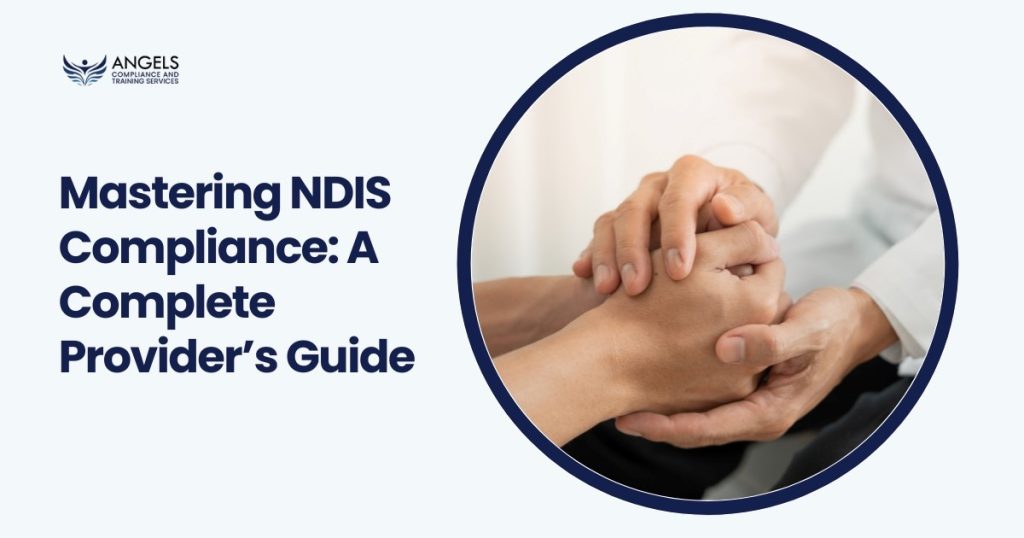When it comes to supporting individuals with disabilities, trust and accountability are non-negotiable. That’s where NDIS compliance comes into play. Whether you’re a new provider or an experienced one, ensuring compliance with the NDIS Quality and Safeguards Commission is not just about avoiding penalties — it’s about delivering high-quality, safe, and participant-centred services.
In this guide, we’ll cover the core requirements for compliance, the consequences of non-compliance, the importance of audits, and how ongoing compliance training can keep your team up to date.
What Is NDIS Compliance?
The Meaning Behind Compliance
In simple terms, NDIS compliance means adhering to the rules, standards, and guidelines set by the NDIS Quality and Safeguards Commission. These rules exist to ensure that participants receive services that are safe, respectful, and of the highest quality.
Why Compliance Matters
- Protects the rights and dignity of NDIS participants
- Builds trust with clients and stakeholders
- Ensures providers meet legal obligations
- Minimizes risks of fines, penalties, or deregistration
Key Components of NDIS Compliance
1. NDIS Practice Standards
All registered providers must comply with the NDIS Practice Standards. These cover areas like:
- Rights and responsibilities
- Governance and operational management
- Provision of supports
- Feedback and complaints management
- Incident management
- Risk management
2. NDIS Code of Conduct
Regardless of registration, every NDIS provider must follow the Code of Conduct, which requires:
- Acting with integrity, honesty, and transparency
- Providing quality supports and services
- Respecting individual rights and choices
- Preventing and responding to violence, neglect, abuse, and exploitation
3. Documentation and Record Keeping
Good record-keeping is critical for compliance. Essential documents include:
- Participant service agreements
- Incident reports
- Risk assessments
- Staff training records
- Audit reports
The Audit Process for NDIS Providers
Why Audits Are Important
NDIS audits are not just formalities — they help ensure your organisation is meeting standards. Audits assess everything from governance structures to how you manage participant complaints.
Types of Audits
- Verification Audit: For low-risk providers offering professional services (e.g., therapists).
- Certification Audit: For providers delivering more complex or high-risk supports, such as daily living assistance or SIL (Supported Independent Living).
What Auditors Check
- Incident management systems
- Complaint handling processes
- Policies around safety and privacy
- Staff qualifications and background checks
- Ongoing improvements in service delivery
Common NDIS Compliance Challenges
1. Keeping Up with Changing Regulations
NDIS guidelines and policies are updated regularly. Providers who fail to monitor these changes risk non-compliance.
2. Poor Documentation Practices
Missing service agreements, lack of training records, or incomplete risk assessments can lead to serious compliance breaches.
3. Inadequate Staff Training
Without proper compliance training, staff may unintentionally breach protocols, leading to issues like safety violations or participant rights infringements.
4. Not Managing Complaints Properly
Ignoring or mishandling participant complaints is a common reason providers fall foul of the NDIS Commission.
Practical Steps to Stay Compliant
1. Develop Strong Policies and Procedures
Create detailed procedures for:
- Risk management
- Incident response
- Privacy and confidentiality
- Complaint handling
2. Conduct Internal Audits Regularly
Don’t wait for the Commission to catch mistakes. Run your own audits at least annually to ensure your processes are tight.
3. Engage in Ongoing Staff Training
Invest in training programs that focus on NDIS rules, participant safety, and service delivery expectations. Make it part of your onboarding and ongoing professional development.
4. Stay Updated with NDIS Changes
Subscribe to NDIS newsletters, attend workshops, and keep an eye on updates from the NDIS Commission to ensure your organisation remains up to date.
5. Foster a Culture of Compliance
Make compliance a shared responsibility. When every staff member understands their role in safeguarding participants, the whole organisation benefits.
What Happens If You Don’t Comply?
Risks and Penalties
- Financial penalties
- Suspension or cancellation of NDIS registration
- Legal action
- Reputational damage within the disability services sector
Real-World Consequences
There have been multiple cases where providers faced deregistration due to failures in complaint management or participant safety. The NDIS Commission takes breaches seriously to protect participants.
The Role of Compliance Training in NDIS
Why Training Matters
Proper training ensures that every staff member:
- Understands the NDIS Code of Conduct
- Knows how to handle incidents and complaints
- Provides services aligned with participant rights and safety
- Reduces risks of accidental non-compliance
What Should Be Included in Training?
- Overview of the NDIS Practice Standards
- Legal obligations and rights
- Complaint and incident management
- Risk management and privacy procedures
- Ethical decision-making
How Often Should Training Happen?
- During staff onboarding
- Annually for all staff
- Whenever NDIS guidelines are updated
Resources to Help with NDIS Compliance
- NDIS Commission Website: https://www.ndiscommission.gov.au
- NDIS Practice Standards Guide: Essential reading for all providers
- Approved Auditor List: Find an auditor to help meet compliance requirements
- Free Webinars and Workshops: Offered regularly by the NDIS Commission and third-party consultants
Wrapping It Up
Staying on top of ndis compliance isn’t just about following rules — it’s a commitment to delivering safe, ethical, and high-quality services to people with disabilities. Whether you’re refining your policies, improving your documentation, or investing in compliance training, every step you take strengthens your business and builds trust with participants.
In this sector, compliance is more than a checkbox — it’s the backbone of excellent service delivery. Stay proactive, stay informed, and always put participants first.


